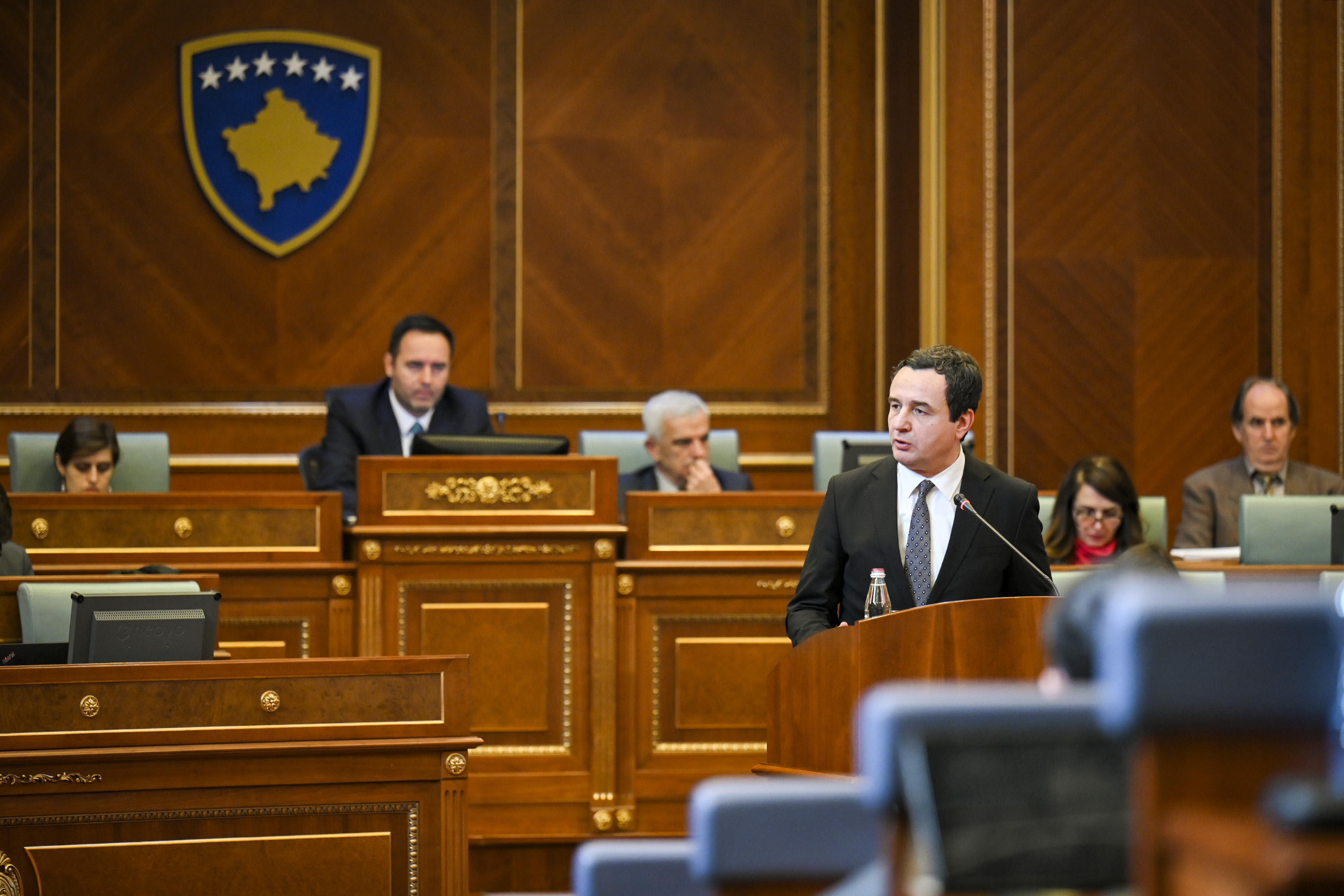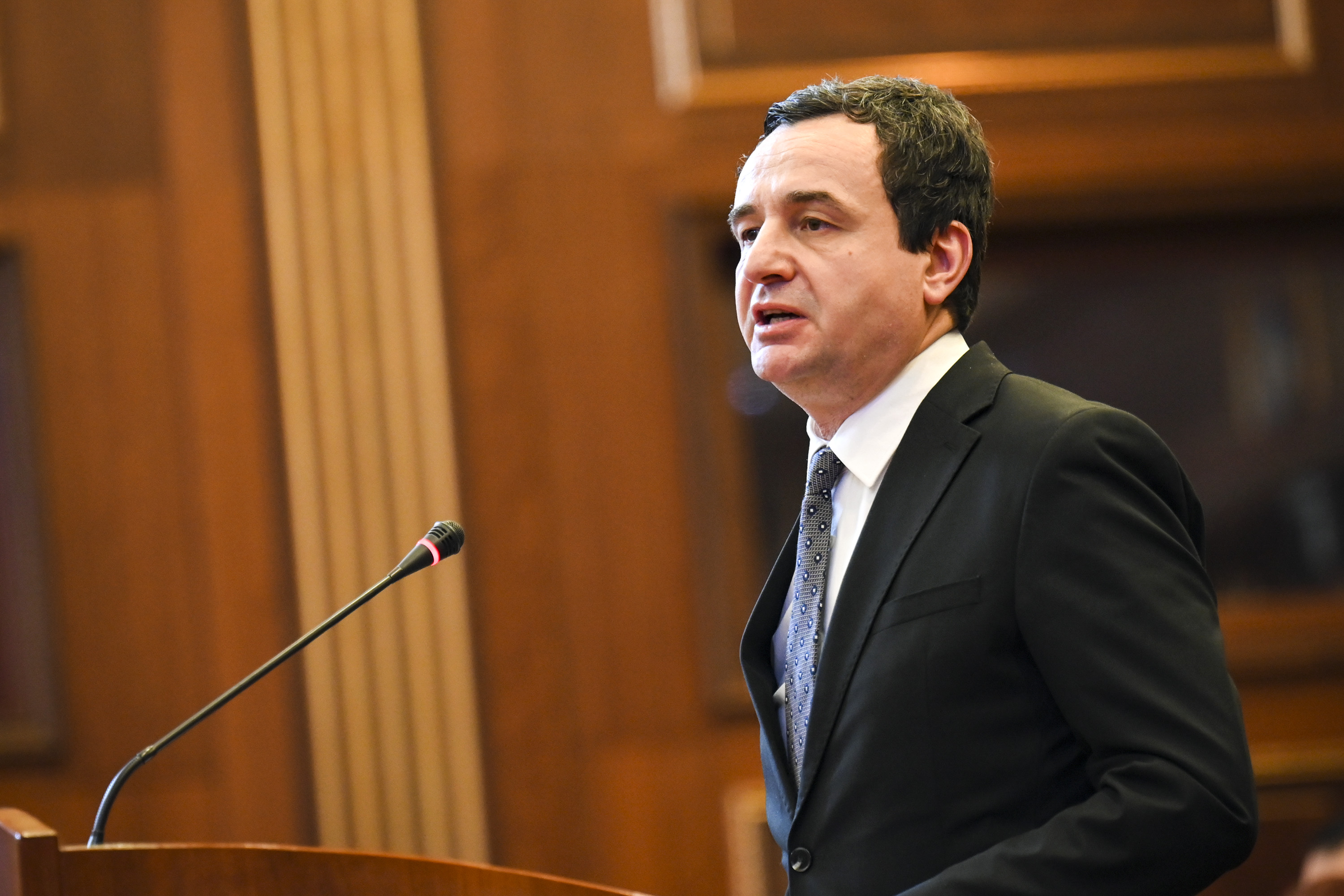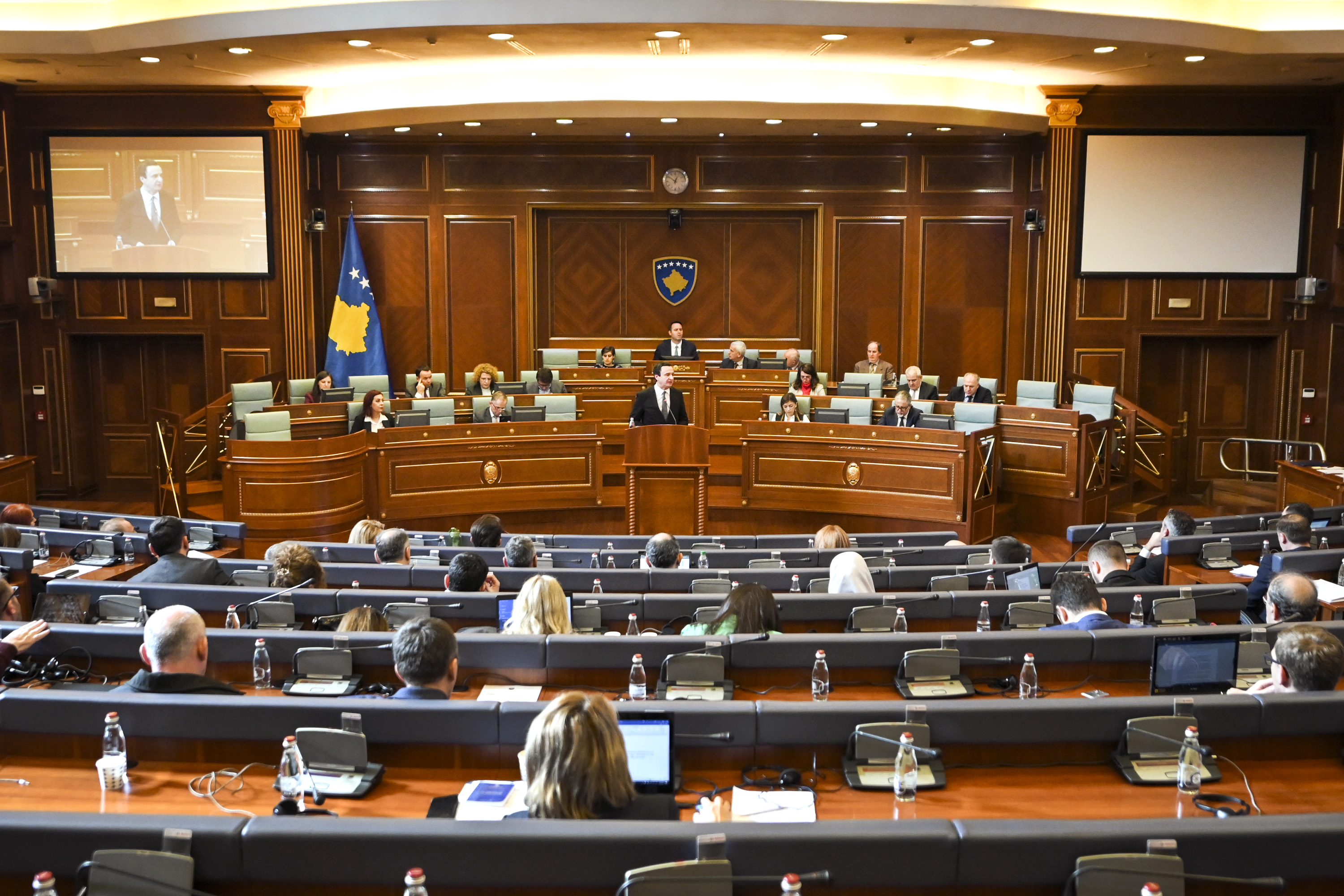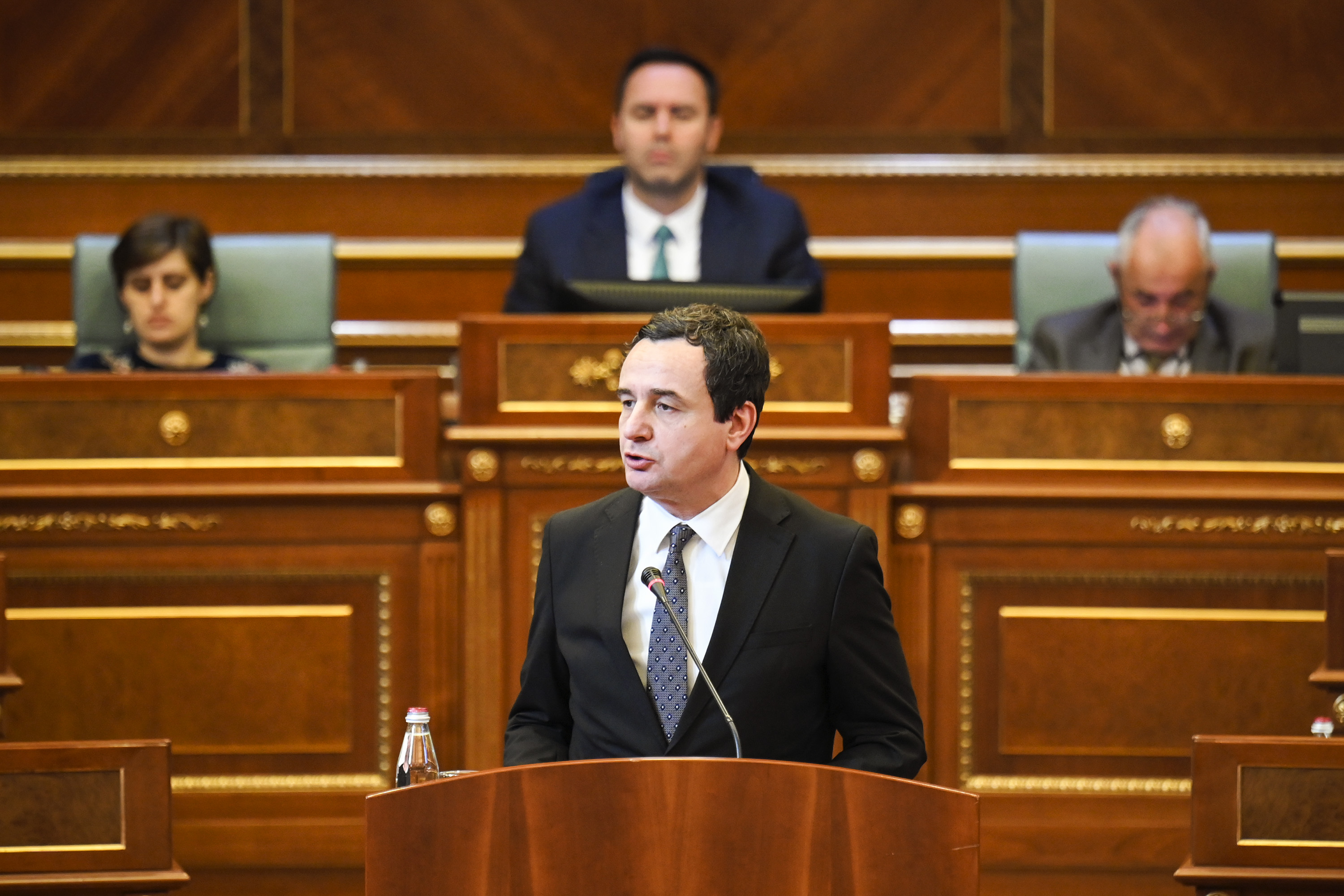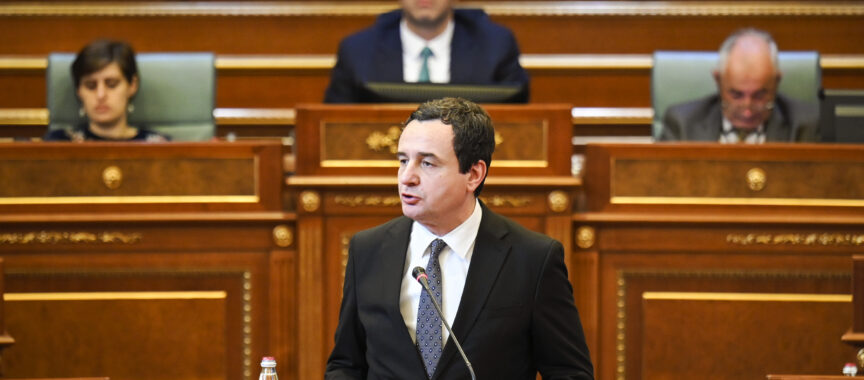Pristina, February 13, 2023
Honorable Speaker of the Assembly, Mr. Glauk Konjufca,
Dear members of the Assembly of the Republic,
Dear Deputy Prime Ministers and Cabinet Ministers,
Dear citizens,
The Government of the Republic of Kosovo has built its strategic approach to the Dialogue with Serbia facilitated by the European Union on the basis of two initial goals:
One, the cessation of the practice of including any potentially contentious issue between the parties in the scope of the Dialogue; our position was that the maximum that could be discussed in Brussels were the problems of the applicability of the existing agreements, that is, those that were signed before our arrival in the Government, and,
two, opening the chapter of a negotiation process for the construction of good neighborly external relations, the principles of international law as two independent states that based their relationship on the premise of mutual recognition of citizenship.
As a result of our initial approach, and our caution to the precedent of 2013 onwards, the High Representative of the European Union and the Vice-President of the European Commission, Josep Borrell, for the first time, in more than 12 years of dialogue, agreed to take the big step, that of the invitation dated August 18, 2022, where he framed the high-level meeting on two central points: one, ‘General framework of the agreement’, and, two, ‘Current Affairs ‘. For the first time, it was decided to include the general framework, i.e. that which regulates the relations between Kosovo and Serbia from outside (internationally), in the format of the Brussels dialogue. The meeting on August 18 was clearly a direct result of our Government’s pressure for the dialogue to move to the stage of international regulation of relations between Kosovo and Serbia, focused on mutual recognition and based on international law, and not on internal issues as it was practice from 2011 until our arrival in the Government. Dialogue for the general framework of the agreement, therefore, not dialogue for dialogue, not dialogue for crisis management.
In the meeting on August 18, I made it clear to High Representative Borrell and President Vucic that Kosovo will no longer accept a Dialogue that is not for a final agreement on mutual recognition. Although the meeting ended without a specific result in the bilateral plan, it gave its immediate effect.
And this is the visit of the emissaries on September 9, 2022, or the presentation of the Franco-German proposal.
On September 9, 2022, the two high emissaries of Germany and France, Jens Plotner and Emmanuel Bonne, together with the European dialogue facilitator, Miroslav Lajcak, arrived in Pristina. They presented to me a proposal for the intermediate normalization of relations between Kosovo and Serbia based on the principle of de facto recognition and its support in the principles of the United Nations Charter (and the clear inter-state principles of international law). The emissaries and the dialogue facilitator asked me to respect two procedural principles until there is a clarification from both sides about moving forward:
One, respecting the confidentiality of the document proposed by them until there is an advancement of the negotiation process; allow me to reiterate that the request for confidentiality was requested in terms of a bilateral obligation that I, as Prime Minister, have towards the countries of the emissaries, and,
Two, to consider it seriously, in the sense that its non-acceptance would seriously affect the diplomatic and political relations of the Republic of Kosovo with the sponsoring states.
Although strict respect for the confidentiality of their document was requested, I decided to invite the leaders of the three opposition parties to inform them of the content of the proposal.
I carefully considered the Franco-German proposal, which we will henceforth call European. After an in-depth analysis, I found that the Proposal contains several characteristics, as follows:
1. The proposal is based on the model of the German-German agreement of 1972 and many other similar models of de-facto recognition of citizenship in the history of inter-state relations (i.e. the Japan-South Korea agreement). The Constitutional Court of the Federal Republic of Germany itself had established (in 1973) that the German-German Agreement included the de-facto recognition of each other’s citizenship and the recognition of territorial integrity from the perspective of international law;
2. The proposal contained the acceptance by the parties of the principle of equality in the international system, which is the key principle of the United Nations Charter regarding relations between independent states;
3. The proposal also determined the recognition by the parties of the principles of equality of sovereigns, territorial integrity, peaceful resolution of conflicts, in relations between Kosovo and Serbia;
4. The proposal included Serbia’s renunciation of preventing Kosovo’s membership in any international organization, which includes not only organizations on the European continent, but also those with a universal scope, such as the United Nations, UNESCO or security organizations such as NATO;
5. The proposal included the recognition of the parties to each other of the right of state representation in the field of international relations;
6. The proposal included the exchange of permanent diplomatic offices, in the form of legations (which are de facto embassies, and which constituted the normal form of inter-state relations before the Second World War);
7. The proposal also contained the norm of recognition of state documents that have international citizenship effect for citizens, including passports, from each other.
8. The proposal, however, also contained two norms related to the rights of the Serbian community in Kosovo, first: the norm that determined that the Serbian community will have a right of self-management “in accordance” with the instruments/conventions of the Council of Europe, as well as has every minority community in the member states of the Council of Europe; and, second, the formalization of the status of the Serbian Orthodox Church, which we have already done through the recognition of the existence of the Church in our law on religious communities in the Republic of Kosovo.
9. The last point 10 provided for the rule that all Brussels agreements would have to be implemented by the parties.
The Government commented on the first version of the Proposal, and requested its advancement towards a final agreement with de jure recognition at its core. We also requested the inclusion of the element of transitional justice for the crimes committed in Kosovo and the respect of both parties to the values of the European Union, including the harmonization of the parties with the policy of sanctions against Russia (convergence with the Common Foreign and Security Policy of the Union European), which is important for separating Serbia from the control of official Moscow.
From the Government’s first comment, we assessed the Proposal as a ‘good basis’ for further discussion. The reasons that led us to conclude that way were:
1. The proposal for the first time focused on the external, international relations between Kosovo and Serbia; all previous agreements were related to internal affairs of Kosovo, and relations between Belgrade and the internal affairs of the Republic of Kosovo.
2. The proposal was based on the principle of reciprocity of rights and obligations of the parties, i.e. Kosovo and Serbia. Reciprocity, which was the main word of the original German-German Agreement, meant an international premise of equality and dignified treatment of the parties to each other. The proposal addresses in almost every norm of its reciprocity in obligations and rights, including, e.g. as for the rights of national minorities, it is the preamble of the Proposal, the third sentence;
3. The proposal has a clear, valuable and universal language, which reflects the standard of inter-state regulation of political and legal relations between independent states;
4. The proposal for the first time contained the de facto recognition of the citizenship of the parties towards each other. The recognition de facto juridically but also politically (as interpreted and offered officially by the emissaries and sponsoring states of the Proposal) is uncontested in the text of the Proposal;
5. The proposal contained the obligation that a final agreement with de jure recognition will be realized in the near future, and it will be an obligation for Serbia before its membership in the European Union.
6. The proposal also referred to the rights of Serbs in Kosovo in terms of the conventions of the Council of Europe, the most important of which is the Framework Convention for the Protection of Minorities, which is now part of the Constitution of Kosovo (Article 22). So, the maximum that could mean such self-management is what the Constitution already foresees in its Article 22. The main proposal has no specific reference to what such self-management will mean, but as long as the ceiling is the Council of Europe Framework Convention, it implies that the result should be some form of guarantees for the individual (non-territorial) rights of minorities, which is based on the individual with rights also according to affiliation and not on their territorializing institutions or monopoly;
7. The only very controversial point is the one related to the acceptance of the implementation of the past Brussels agreements, most of which unfortunately are agreements that contain the mono-ethnic element, the territorial element and that of monopolizing the representation of the Serbian community in the hands of Serbian list controlled by Belgrade.
I judged that the Plan contained clear principles of international law concerning relations between independent states, referred to the Charter of the United Nations as a document addressed only to independent state actors, and, for the first time, included universal concepts and civilizing the democratic future of the parties on the European continent.
And now allow me to move on to the visit of the emissaries on January 20, 2023, to the European Plan, the final version.
Dialogue facilitator Lajçak offered a second version of the Proposal on December 6, 2022. The second version has addressed two of our comments, but has not moved back on any of the principles that the first document enshrined. However, the main document this time was also accompanied by an Implementation Plan that had a clear reference to a statute that the Management Team would draw up, an obligation derived from the 2013 Agreement, and which is an indication of a step towards the creation of an association of municipalities with a Serbian majority. On January 20, 2023, the emissaries who accompanied the facilitator Lajçak, i.e. the American, German, French and Italian emissaries, gave him some positions in this second and last meeting:
– They made it clear to me that the main proposal this time is very close to the ‘take-it-or-leave-it’ format. It will practically not be allowed to open or negotiate it. Their position was that the entire diplomatic and political apparatus of the countries from which the emissaries came is in support of Kosovo’s membership in international organizations, and we cannot expect a ‘no’ from Kosovo because we would enter a path of confrontation with them ;
– They also made it clear to me that any rejection of the Proposal will be accompanied by counter-punitive diplomatic steps for Kosovo, and will create a serious weakening of trust between us and their countries.
I also gave my comments in the second version at the very beginning of that meeting we had on January 20 here in Pristina, and again in written form. Both the first time and the second time, my comments have a written form. My position at that meeting was that the main proposal is acceptable in principle, but it should include more guaranteeing elements and assurances of effectiveness in terms of Kosovo’s membership in international organizations, increasing the number of recognitions and a sequencing of events in such a way that normalization between the two states makes sense.
After the visit of the dialogue facilitator, Miroslav Lajčak, on February 6, 2023, and the clarification of some of the mechanisms and sequencing elements that will be negotiated within the Implementation Plan, I confirmed to him that the European Union Proposal is a good basis for further talks and a solid platform to move forward. This means that the acceptance of the main document is without prejudice to the negotiation of the Implementation Plan which should include elements related to the implementation mechanisms, the sequencing and the understanding of some of the principles mentioned in the main Proposal.
On this basis, I emphasize the following:
First, the acceptance of the main proposal constitutes a serious advance in international relations with Serbia, as two states that recognize each other’s citizenship de facto;
Second, the master plan has no reference to an Association, although it refers to the Brussels agreements in their entirety; and
The third, now, the main step where the most serious questions will arise in connection with the Association will be in the process of negotiating the Implementation Plan. There, my position is that the Association can be considered if the 6-point or 6 conditions are met, the principles that I presented to you here a week ago.
Thank you.
Last modified: February 14, 2023
